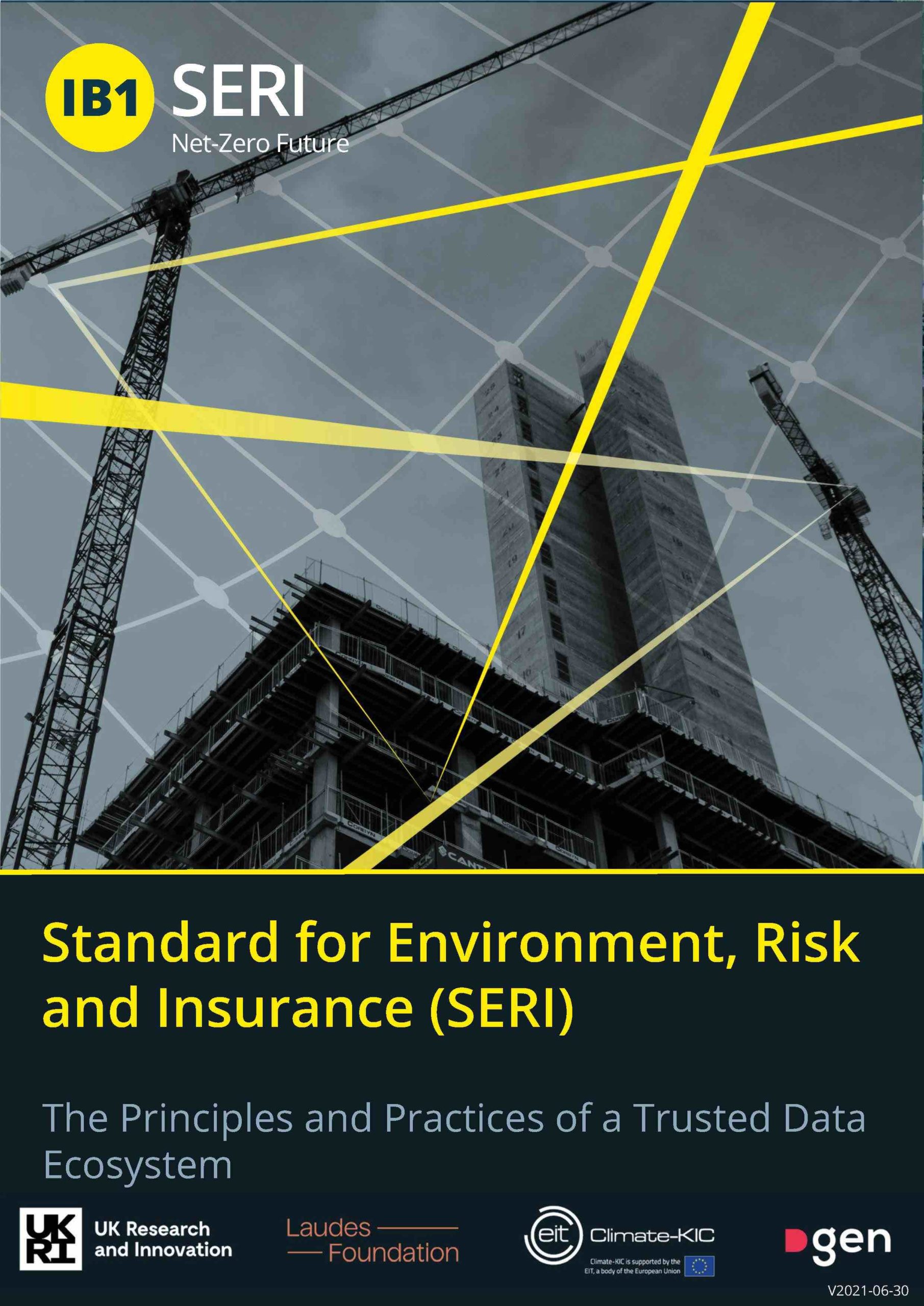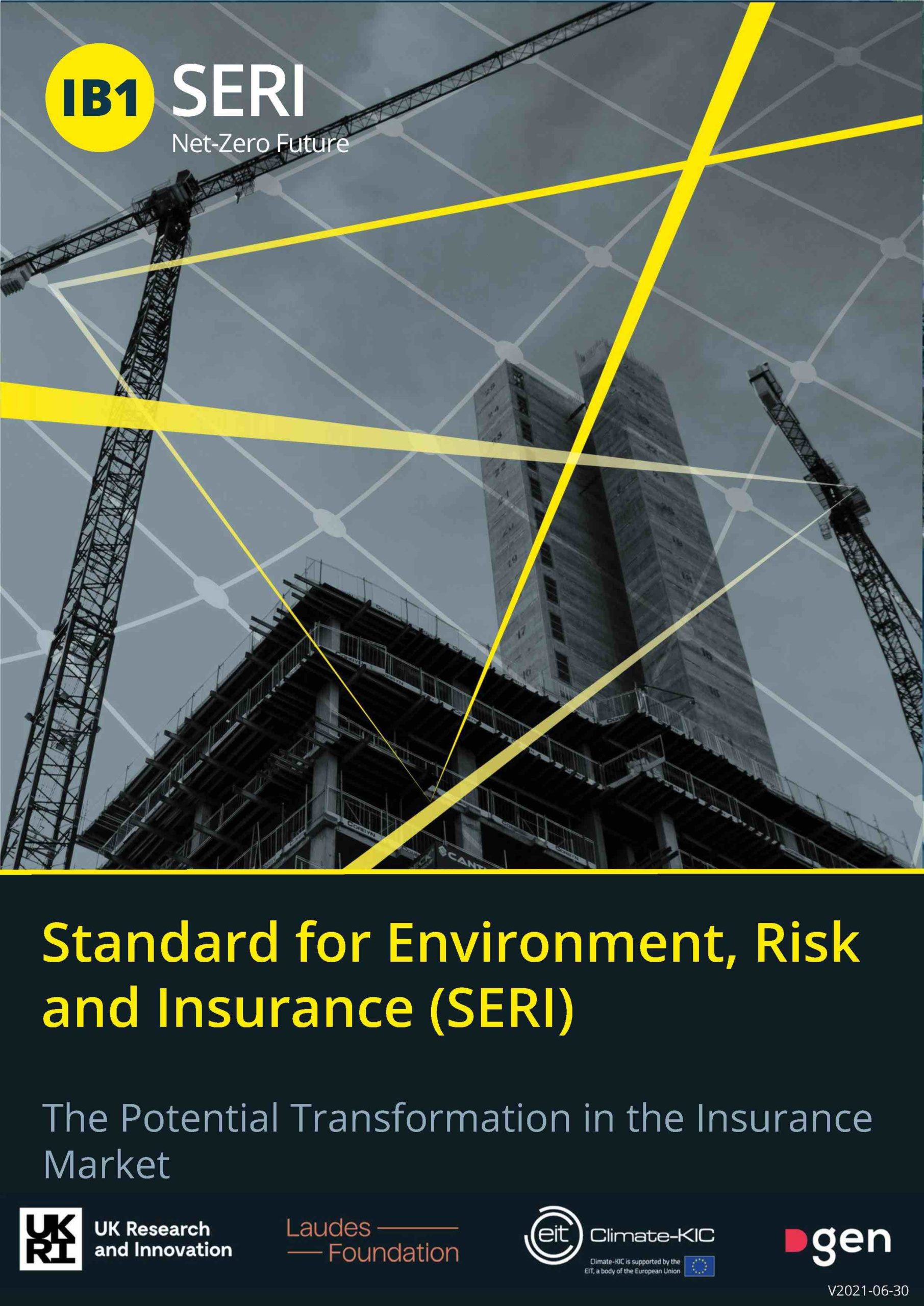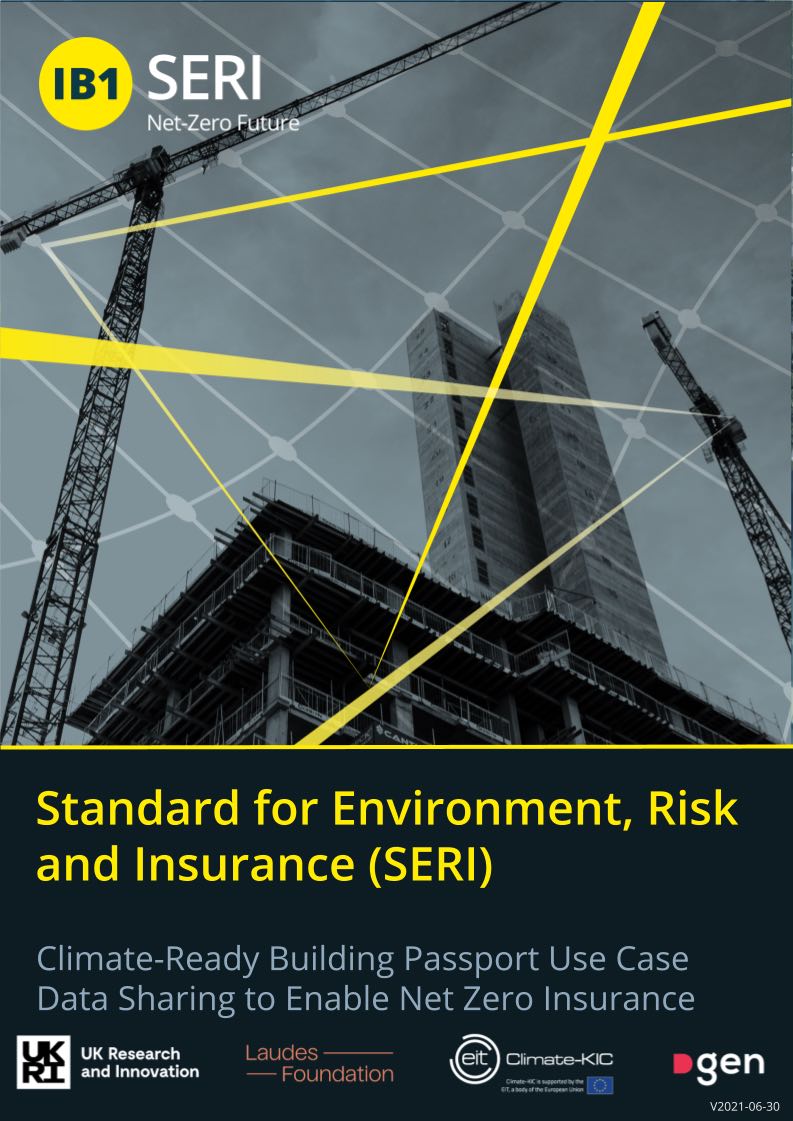This report details the massive opportunities to disrupt the market for those that are able to consume data, automate processes and use artificial intelligence to assist with risk selection and pricing, and how a shared data governance framework can transform the market.
SERI
“Nothing gets invested in unless it’s insured”
About Phase 1
Launched in 2020, SERI (Standard for Environment, Risk and Insurance) is a UKRI, Climate-KIC and industry funded programme bringing partner organisations and leading institutions to bridge the data gaps between finance and climate change. Its ambition is to build the shared data infrastructure that will underpin and enable a transition to a green economy, and to a green financial system. For Q&A, please see the SERI FAQ.
The SERI aim is to create a clear, impactful and detailed data governance framework (the Standard for Environment, Risk and Insurance) that enables government, businesses, consumers and 3rd party developers to understand the potential of sector-wide data sharing in insurance to develop climate-ready financial products. Using industry-defined use cases to frame user needs, it will detail the steps to implementation in the UK and empower decision-makers to mandate, measure and act upon the data-flows that enable Net Zero.
SERI partners: Aon, Arup, Agvesto, Bird & Bird, Brit Insurance, ClimateWise, Dais LLP, Lloyd’s Register Group, Cambridge Zero at the University of Cambridge and Willis Towers Watson.
If you think your work aligns with SERI, and would like to join our work, please email seri@icebreakerone.org.
Outputs
The outputs from this project include necessary pieces to fulfill the goals and aims of the project: the creation of insurance products to drive towards net zero, underpinned by an open standard for enabling access to environmental and financial data evidenced with an in-depth use case.
Each report and mapping exercises lay the pathway for a data governance framework for the insurance sector, the creation of insurance products which drive towards net zero, and details of the steps to implementation of SERI in the UK.
The deliverables for this project discuss:
What is SERI and how can it be used in the market?
- The Principles and Practices of a Trusted Data Ecosystem: The SERI principles and best practices will build on those of Open Banking and Open Energy. Our SERI principles and standards work is founded on the SERI Phase 1 Standard report and the wider Icebreaker One vision of empowering decision makers to mandate, measure and act upon data flows that enable net zero. Our recommendations are that, in cases where many-to-many data sharing is required, as is evident in the SERI insurance market use case, a Shared Data Governance approach is the most effective option to deliver the objectives for data interoperability, standardisation and efficiency.
- SERI: The Potential Transformation in the Insurance Market: Details the high-level business model and market transformational opportunities for an open standard for data sharing within the insurance sector. This report discusses how the SERI project established that by creating a new way of working with data, data elements not currently accessible could be integrated into the underwriting process. In turn, this can enable new products to be developed that focus on mitigation of carbon emissions to remain relevant to consumers and support the necessary transition of the economy as a whole. A trusted, shared data infrastructure would support insurers in reaching this goal.
- An ecosystem concept map for the Standard for Environment, Risk, and Insurance use case which displays how data sharing can occur in the insurance sector. Throughout the project, Icebreaker One has mapped the data flows and various actors and how they interact in the insurance sector.
- Climate-Ready Building Passport Use Case Data Sharing to Enable Net Zero Insurance: The market use case is based around the Climate-Ready Building Passport concept and utilises the special position of insurance brokers in the insurance value chain to bring key stakeholders, i.e. asset managers and insurers, into the story. It analyses data needs, data sharing and data flow amongst them in a commercial building insurance case to demonstrate the value of the Climate-Ready Building Passport and a data sharing framework for the insurance industry and beyond in the net zero transition.
What is the pathway for SERI to advance the adoption of a data sharing governance framework across the insurance industry to drive towards net zero?
- A Pathway Towards SERI: Operational and Technical Considerations: This document builds on the Phase 1 open standard work published in December 2020. This report discusses the lessons learned from Open Banking and Open Energy, and the transferability of their technical and operational elements to SERI. It also maps the data required for the use case, along with other data elements which can be used to develop climate-ready property insurance products. Finally, this report details the recommended SERI data sharing governance framework and a pathway for opportunities for an open standard for data sharing within the insurance sector.
- Envisioning SERI’s Regulatory and Data Sharing Framework: An outline of the high-level SERI governance framework and regulatory recommendations to enable organisations to share data without the need for bilateral contracts, and examine the potential for preemptive licensing frameworks. This report incorporates the lessons from Open Banking and Open Energy on five components which need to be defined for a data sharing framework including authorisation, data sensitivity categories, trust framework, liability, and standards stewardship. Additionally, this report details four policy and regulatory recommendations to set up the conditions for a SERI shared data governance to flourish.
Prior SERI Reports (Published December 2020)
- Stakeholder Mapping
- Business Models
- User Needs Analysis
- Phase 1 Standard: Based on the above three reports, we describe the progress achieved and deliverables accomplished covering Policy & Regulation, Systems and Standards for a Standard for Environment, Risk and Insurance (SERI)’s Phase 1—a standard for environmental and financial data sharing.
Further reading, webinars and related assets
Webinar — progress overview
On the 28th of June 2021, we held our final London Climate Action Week event, where we had a panel of varied insurance industry experts to examine the role of insurance in the UK’s commitment to the Paris Agreement and the drive towards our Net-Zero Future.
On the 18th of November 2020, we hosted a show and tell as part of London Climate Action Week – our team presented on progress eight months into the programme to develop a Standard for Environmental Risk and Insurance (SERI).
Programme overview
SERI was born out of an 18-month consultation with the insurance industry, policymakers and individual practitioners, during which the project team had conversations with more than 230 experts. During our consultation, we heard that as large climate-driven catastrophic events occur with higher frequency, the UK’s insurance market needs to evolve. While huge opportunities exist to deliver innovative financing for a resilient and net-zero future, a lack of data flow is leading to the misallocation of resources and missed opportunities which creates catastrophic risks on our global balance sheets
The wealth of environmental, financial, and risk data we as a society hold must be used to direct capital to address our climate and environmental crises while helping reduce transaction costs and increase the use of Shared Data within the insurance sector.
How are we doing this?
Building upon the approach of the Open Banking Standard, co-chaired by Gavin Starks (Icebreaker One’s CEO), we are acting as an independent third party to convene the relevant stakeholders; insurance brokers, data providers, legal expertise, and academic researchers. This enables us to break-through silos to overcome this collective action challenge.
In 2020, the SERI programme focussed on developing climate-ready financial products to enable insurers to invest in demonstrably net-zero financial products and services. In 2021, the SERI programme focussed on a Climate-Ready Building Passport concept to develop a use case to explore what can be enabled with a shared data infrastructure. To do this, we have been engaging with our partners, and have formed Advisory Groups to engage with a broader base of stakeholders around key pieces of our strands of work:
- Advisory Group 1: Commercialisation and User Needs focussing on the development and validation of a specific climate-ready building passport use-case, articulating the user needs addressed by and market opportunities enabled by having an open standard for data sharing within the insurance sector.
- Advisory Group 2: Systems and Standards focussing on the development of high-level operational and technical guidance for the governance framework, the concept map for the standard, and recommendations for principles and practices to enable the standard.
Our diverse Advisory Group members include individual experts from: Aon, Brit Insurance, ClimateWise, Lloyds Group, Arup, Bidwells, Centre for Digital Built Britain, Institute and Faculty of Actuaries, Building Stock Lab (UCL Energy Institute), AIR Worldwide, QOMPLX, Katrisk, JBA Risk Management, Demand Logic, Greenkite, Bright Blue Hare, Resilience Brokers, Insurance Development Forum, iBRoad, Chetwoods Architects, Resurgence, Impact Management Project, and Quantenergy.
Check out what our Advisory Groups have been discussing — see our update from the final Advisory Group meeting. If you think your work is relevant, get in touch with us on: seri@icebreakerone.org.




